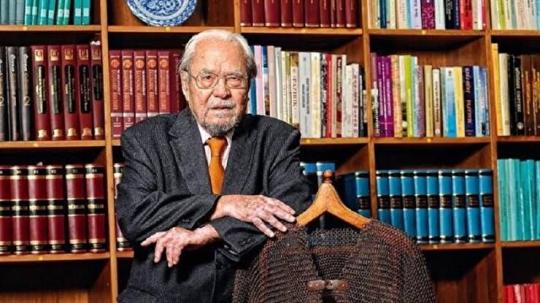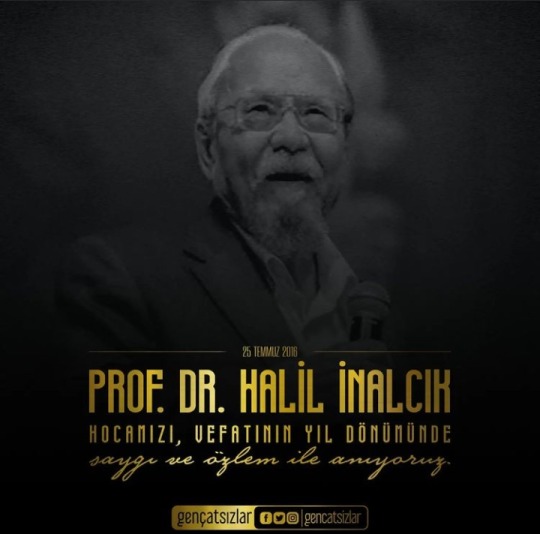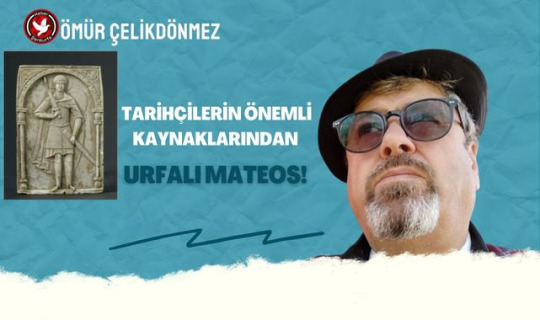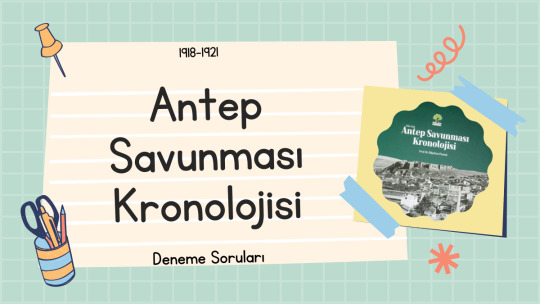#halil inalcık
Text
♾️ DEĞERLİ TARİHÇİMİZ,AYDINIMIZ HALİL İNALCIK'I ARAMIZDAN AYRILIŞININ 6.YILINDA SEVGİ VE SAYGIYLA ANIYORUZ GÖK TENGRİ UÇMAĞA VARSIN ✊🏻

2 notes
·
View notes
Text
#Osmanlı'da Kanuni'ye kadar Bektaşi anlayışı hakimdi (Türk yorumu). Kanuni'den sonra uygulamaya alınan yarım yamalak şeriat düzeni koca imp#bugün uyduruk şeriat rejimi peşinde koşanları anlamak mümkün değil!#Prof Dr Halil İnalcık#AtatürkRuhu
2 notes
·
View notes
Text
Milletleri millet yapan tarihleri ve kültürleridir. Tarihsiz bir millet kişiliğini kaybetmiş bireye benzer."
Prof. Dr. Halil İnalcık
79 notes
·
View notes
Text
"İnsanlar yalnızca okumak için değil, birlikte yaşamak içinde kitap alırlar..." Halil İnalcık
#semaamagökyüzüolmayan#semamagokyuzuolmayan#kitapkurdu#kitaplık#kitaplar#kitap alintilari#kitap alıntıları#kitap alıntısı#kitap#books#post#blog post#long post#my post#text post#books & libraries#love#sevgilim#i love you#new books#booklr
42 notes
·
View notes
Text
I repeat one of my comments posted on Youtube
If I had my say on the way Suleiman's children were portrayed, because like a lot of people, I didn't like the way it was written in Magnificent Century, that's what I would do. ( In my eyes, Mustafa was seen as a pure white sehzade, which therefore made him in my eyes more stupid and less interesting than he actually was. Mehmed was practically erased of his personality and seen as a pure Gary Stu like his half brother. Cihangir, who I adore, yet in the series was too naive. Selim is seen as evil, etc...)
I would respect the historical point of view more. I propose an alternative version, I would have added Suleiman's children he had when he was sehzade with his other concubines before he became Sultan and met Hurrem and then had them die of the plague as it was historically.
Sehzade Mustafa - I would keep his childlike personality, except he is not close to his siblings (because of the fratricidal law), and I wouldn't put him close to Ibrahim at least until he becomes an adult and allies himself with him. I would let his mother take care exclusively of his education. A young man who craves recognition and attention from his father, who often neglects him in return over his other children due to the fact that Mahidevran is the Sultan's least beloved concubine. The more he becomes an adult, and especially a father, the more he resents his father because of the way he treats his mother and him. He does not really understand his father and therefore his fears due to the fact that he did not grow up close to him. I would keep his efficient heir personality because he performs very well despite his father never teaching him well because of his mother who is a very good advisor. Instead of doing something for his military glory or showing off his harem too much, I would focus on how he improves the lives of common people exhausted by too much conquest. I would make his guilt very ambiguous, at the start it is clear that he wants to wait for his father to die to have the throne and restore his mother's honor, however, he realizes that his father lets his vizier lead his life impossible to see even encourages him, does not hide that he preferred to have a son of Hurrem on the throne no matter what Mustafa will do. Following this, the sehzade wants to have a second plan like his grandfather in case Suleiman wants to abdicate in favor of another of his sons which would put him in danger (which could explain the Venetian correspondence, others say that it was a plan to prevent his brothers from escaping if one day he became Sultan) but hesitates to actually carry it out, then after some hesitation goes to his father's tent and gets strangled. Instead of doing Atmaca, I would focus on Mustafa's son-in-law, Nergissah's husband who started as Rustem's ally and becomes his most loyal supporter ( it seems that it is more a legend than truth, but I didn't remeber well as I didn't have on me my books of historian like Halil Inalcık) . So I would avoid making a treacherous Sehzade, his mistakes would be understandable, but he wouldn't be a pure white Sehzade.
Sehzade Mehmed: it's more complicated for him because he died without having proven himself in a complicated province like Amasya, so it's quite difficult to make a comparison with Mustafa. But I would make sure to give him a real personality: initially close to some of his brothers like Selim and Bayezid, he becomes, despite his mother, more distant towards them because of the fratricide (Mehmed II had therefore legalized it there is not much way to escape from it at the time unlike MCK) although he is very close to Cihangir and his sister. Unlike Mustafa, his father trained him in the regency of the palace and he did very well by dint of advice and practice. When he is sent to the provinces, he often listens to his mother's advice when she visits him. Knowing that he has the support of the statesmen against Mustafa he realizes knowing his father better than his half brother that he will have to play the role of the obedient sehzade not interested in politics although deep down he prepare for it. He has the happiness of being a father but dies immediately afterwards.
Mihrimah Sultan- I would make sure to respect the historical Hurrem who wants her daughter to have a marriage of love and happiness. However Suleiman prefers Rustem, and she accepts him immediately because she will do everything to save her brothers and convince her mother to accept this marriage. I would rather show her as a politician as well as her diplomatic relations. However, I would underline the unjust side of Suleiman, he had Mustafa executed and condemned Mahidevran to poverty but refuses to punish Mihrimah by banishing her because she would have helped Bayezid financially during his rebellion. Their relationship would be cold for a time before reconciling. She will be reconciled with her brother Selim because basically they only remain and will be an ally of Nurbanu.
Sehzade Abdullah- I would have included him even if he died very young.
Sehzade Selim- Initially a cultured young man very focused on charity work like his mother and sister and very sober. Nevertheless it is often sad due to the law of fratricide. When Mustafa dies, he realizes he has a chance to escape it and he will fight in a wicked way especially for his son Murad because he knows that Bayezid's temper will put him in danger besides fratricide. He knew how to recruit powerful and efficient state members. He is on the whole an obedient sehzade but who is disgusted with his father's treatment of Mahidevran (after all she is no longer a threat to him she no longer has a son) and who will take risks to her by helping her financially. As the hardships go on, his depression increases he drinks more and more especially after his sister takes the part of Bayezid, that his brother Bayezid dies, and the fact that he is obliged to make other sons in the case where Murad dies without an heir which means that he knows that his other sons will be condemned to death. He has become a broken leader although he makes sure there is effective governance.
As a Sultan he must face his father's mistakes, including the way he led the Empire, including too many wars and unnecessary conquests in Europe.
Sehzade Bayezid- Him complicated. Due to his explosive temper he is the black sheep of his siblings (Mustafa does not count since he is a half brother, they do not even know each other) and the most incompetent of Suleiman's sons and Suleiman is worried because he has inherited the worst faults of Selim Yavuz like being angry easily (without having had his qualities). Yet deep down he wants affection and that's why he has several children even if it's irresponsible, his mother favors him because she's afraid for him because he has too impulsive nature . Mihrimah comes to his aid only in memory of his mother, because deep down she prefers Selim, Bayezid knows this, which means that he hardly listens to her. She only helps him financially as a last resort because she couldn't convince him to call off the rebellion. Suleiman was more lenient to his mistakes that Mustafa (we could once again underline the unfair side of Suleiman again with this) until the point that he took refuge to the Shah.
Sehzade Cihangir- A cultured young man very close to his parents and very sick. I would make him a supporter of Selim because although he is close to him, he also knows that he is his only chance of survival because he is not close to Bayezid at all. He often sends information from the Palace to Selim to better aid him in managing his province and at times advises him to be more ruthless in his quest for the throne while remaining an obedient sehzade. It would therefore be a good adviser for Selim (and it would give him more personality). He cannot therefore be limited to the role of a simple supporter but also of a valuable advisor.
And that's how I would portray them if I were in the place of the screenwriters. They are all very nuanced (we avoid all white or all black), we can freely pick a favorite without trying to favor another sehzade at all costs, and I try to be consistent with what we know about them and try to explain why they did mistakes or make sucess.
#magnificent century#mihrimah sultan#sehzade bayezid#sehzade selim#Mustafa sehzade#hürrem sultan#suleiman the magnificent#sehzade Mehmed#mahidevran hatun#Şehzade Cihangir#historical interpretation#historical inaccuracies
7 notes
·
View notes
Note
I found your recent post on wine legality under Ottoman rule very interesting. I have tried to make a study of Ottoman history(I am mostly familiar with it's history from the 19th century onwards and have done deep dives into the rebellions in Greece and Egypt, I could talk all day about either Ali Pasha). Unfortunately since then I've had trouble finding good books on Ottoman history. I was excited by your mention of the book Crime and Punishment in the Ottoman Empire. I was wondering if you had any other books on Ottoman history that you could recommend?
Sure! Keeping in mind that I’m not a historian or an educator of any kind, I just read history for fun (and I’m mostly into rogues and cities, which may show), here’s what I got. Highlights in bold, links are to excerpts I’ve occasionally posted:
Caroline Finkel, Osman’s Dream: The History of the Ottoman Empire (2005) [this is a decent single book, narrative and accessible; I’m a big fan of having an easy-to-read introduction that covers a large period as a starting point, and taking it from there; I’m also a big fan of wikipedia]
Halil İnalcık & Donald Quataert, An Economic and Social History of the Ottoman Empire (1997) [this is nitty gritty but I think essential, 2 volumes, pass once and keep handy for references]
Halil İnalcık, The Ottoman Empire: Conquest, Organization and Economy (1978) [essay collection]
Halil İnalcık, The Ottoman Empire: The Classical Age 1300-1600 (1973)
Suraiya Faroqhi, The Ottoman Empire and the World Around it (2007) [I like things in context; for the Ottomans you always gotta keep in mind what was going on with Venice, Persia, the Arabs, the Hapsburgs, etc]
Suraiya Faroqhi & Kate Fleet, The Ottoman Empire as a World Power, 1453–1603 (2006)
Suraiya Faroqhi, The Later Ottoman Empire, 1603-1839 (2006) [these two are volumes from the Cambridge History of Turkey]
Donald Quataert, The Ottoman Empire: 1700-1922 (2005)
M. Şükrü Hanioğlu, A Brief History of the Late Ottoman Empire (2008)
David Fromkin, A Peace To End All Peace: The Fall of the Ottoman Empire and the Creation of the Modern Middle East (1989)
The Law and lack thereof
Colin Imber, The Ottoman Empire, 1300-1650: The Structure of Power (2004)
Sam White, The Climate of Rebellion in the Early Modern Ottoman Empire (2011)
Uriel Heyd, Studies in Old Ottoman Criminal Law (1973)
Karen Barkey, Bandits and Bureaucrats: The Ottoman Route to State Centralization (1996)
Erol Ozan Yilmaz, Militarizartion of Ottoman Rumelia: The Mountain Bandits (1785-1808) (2016, thesis)
“Banditry in the Ottoman Empire”
Haim Gerber, State, Society, and Law in Islam: Ottoman Law in Comparative Perspective (1994)
Joshua M. White, Piracy and Law in the Ottoman Mediterranean (2017)
Cities
John Freely, Istanbul: The Imperial City (1998) [a joy to read, not really the product of rigorous research, but written by a well-read guy who’s in love with the city, and I think that accounts for something]
Ebru Boyar & Kate Fleet, A Social History of Ottoman Istanbul (2010)
Fariba Zarinebaf, Crime and Punishment in Istanbul 1700-1800 (2010)
Zeynep Çelik, The Remaking of Istanbul: Portrait of an Ottoman City in the 19th Century (1986)
Mark Mazower, Salonica, City of Ghosts: Christians, Muslims and Jews 1430-1950 (2004)
Heghnar Zeitlian Watenpaugh, Image of an Ottoman City: Imperial Architecture and Urban Experience in Aleppo in the 16th and 17th Centuries (2004)
Nikolai Todorov, The Balkan City, 1400-1900 (1983) [very nitty gritty, you can’t read this for fun, but it’s got demographics and stuff you won’t find elsewhere]
Ulrike Freitag et al, The City in the Ottoman Empire: Migration and the Making of Urban Modernity (2011)
Biray Kolluoğlu & Meltem Toksöz, Cities of the Mediterranean: From the Ottomans to the Present Day (2010)
Etc
Suraiya Faroqhi et al, Living in the Ottoman Ecumenical Community (2008)
Robert Dankoff & Sooyong Kim, An Ottoman Traveller: Selections from the Book of Travels of Evliya Çelebi (2010)
Robert Dankoff, An Ottoman Mentality: The World of Evliya Çelebi (2007)
Mark Alan Epstein, The Ottoman Jewish Communities and their Role in the 15th and 16th Centuries (1980)
Dror Ze’evi, Producing Desire: Changing Sexual Discourse in the Ottoman Middle East, 1500–1900 (2006)
Stephen Ortega, Negotiating Transcultural Relations in the Early Modern Mediterranean: Ottoman-Venetian Encounters (2014)
Douglas Scott Brookes, The Concubine, the Princess, and the Teacher: Voices from the Ottoman Harem (2008)
Madeline C. Zilfi, Women and Slavery in the Ottoman Empire (2011)
Dana Sajdi, Ottoman Tulips, Ottoman Coffee: Leisure and Lifestyle in the 18th Century (2007)
Sevket Pamuk, A Monetary History of the Ottoman Empire (2007)
75 notes
·
View notes
Note
çoook teşekkür ediyorum bir de tarihi bölümlerine ayırırsak osmanlı tarihi ve türkiye siyasi tarihi hakkında önerin var mı bu konularda çok çok eksiğim hem tarihi yorumlayarak öğrenmeme yardımcı olacak hem de anlatımı net kitap önerin var mııı
rica ederim <3 şimdi şöyle ki bahsettiğin tarihlerin yazalarlara bağlı olarak oldukça dikkatli ve görece objektif kaynaklardan okunması gerekiyor. ben bu dönemler hakkında henüz hakkıyla okuma yapmadım fakat birkaç bir şey önermeye çalışayım çerçeveyi çizmek adına:
tarih dediğimizde muhakkak halil inalcık, avrupa tarihiyle harmanladığımızda cemil meriç, iktisâdî vecheden şevket pamuk.
bir de üst dönemimin önerileri var idi, kefil olmamaklar beraber:
modernleşen türkiye’nin tarihi, eric jan zürcher,
memâlik-i osmaniye’den avrupa birliği’ne, çağlar keyder,
iktidarın sembolleri ve ideoloji, selim deringil.
ayrıca siyasi geçişleri okuyabilmek adına, taraflı fakat iyi bir kaynak olarak: osmanlı-türk anayasal gelişmeleri, bülent tanör.
henüz okumamış olmakla beraber süleyman seyfi öğün’ün yine kitapları ve ayrıca günlük siyaset için makalelerini önerebilirim. fuad köprülü’ye de elbette şüphesiz bakabilirsin.
fakat dediğim gibi tarih mevzusunda yazılan çizilen çok şey, dolayısıyla çok kaynak var ben de yüzde yüz hâkim değilim elbette, işin daha çok teorik tarafındayım hâlâ. biz üniversitede ekolümüz gereği daha çok fransız ve avrupa tarihi okuyoruz bir de. ek olarak okuduğum/ yararlandığım makale ve kitaplar da var tabii. şu anlık bunlara bir göz atabilirsin, unuttuğum kesinlikle önemli kaynaklar var…aklıma gelirse eklerim inşallah.
#tekrar yazdım..silinmiş..#btw beş yaşında osmanlı padişahları kataloğunu her satırını ezberleyen birinw göre yine iyi tabsiye verdimagqhbaahnsjc
1 note
·
View note
Text

Nam-ı diğer "Tarihin Kutbu" Halil İnalcık hocamızın vefat yıl dönümü Ruhu şad olsun.
3 notes
·
View notes
Text
halil inalcık ve obama arasındaki bağlantıdan sonra kimse bir şey diyemez zaten espri bayağı iyi
Size gülmek düşer
0 notes
Text
"Tarihçilerin Kutbu" Prof. Dr. Halil İnalcık, 6 yıl önce bugün aramızdan ayrıldı.
İnalcık, Atatürk'ün vefat ettiği günü gözyaşları içinde anlatmıştı: "Bugün yaşıyorsak, bugün bir devletimiz, milletimiz varsa Atatürk’e borçluyuz"
2 notes
·
View notes
Text
TARİH /// Ömür ÇELİKDÖNMEZ : Tarihçilerin önemli kaynaklarından Urfalı Mateos !!!
Ömür ÇELİKDÖNMEZ : Tarihçilerin önemli kaynaklarından Urfalı Mateos !!!
Türkiye’de yeni nesil tarihçilerin piri merhum Prof.Dr. Halil İnalcık derler. Osmanlı devri tarihçileri arasında onlarca isim sayılabilir. İlkçağ tarihçilerinin üstadı ise antikçağ Halikarnassos olarak adlandırılan günümüzdeki Batı Anadolu’da Bodrum’da dünyaya gelen Heredot kabul edilir. Aynı şekilde cofrafyacilar…

View On WordPress
0 notes
Text
Tarih Okuma Sırası
Fuat Köprülü
Halil İnalcık
İlber Ortaylı
Emrah Sefa Gürkan
0 notes
Text
Antep Savunması Kronolojisi Soruları
1. “Antep Savunması Kronolojisi” adlı kitap hangi tarihleri kapsamaktadır?
A)1920-1923
B)1919-1921
C)1918-1921
D)1918-1922
E)1920-1923
Antep Savunması Kronolojisi Soruları
1. “Antep Savunması Kronolojisi” adlı kitap hangi tarihleri kapsamaktadır?
A)1920-1923
B)1919-1921
C)1918-1921
D)1918-1922
E)1920-1923
2. “Antep Savunması Kronolojisi” adlı kitabın yazarı kimdir?
A) İlber Ortaylı
B) Halil İnalcık
C)Fevzi Paşa
D) Damat Ferit Paşa
E) Bilgehan Pamuk
3. “Müslüman toprağında heç gâvur olur mu!” diyerek Anadolu’nun…

View On WordPress
#Antep Savunması Kronolojisi#Antep Savunması Kronolojisi çalışma soruları#Antep Savunması Kronolojisi deneme soruları#Antep Savunması Kronolojisi soruları#Antep Savunması Kronolojisi yarışması
0 notes
Text
Halil İnancık Tanzimat Nedir
Halil İnancık Tanzimat Nedir
10 sonuç
Boyut
Önizleme
İndirme
Tanzimat Dönemi Kanunlaştırma FaaliyetleriTanzimat Döneminin 1. Dünya Savaşı’nın başlamasına kadar devam ettiğini iddia edenlerin yanında, söz konusu dönemin bitiş tarihini daha sonraki dönemlere kadar uzatanlar da yok …Kaynak: https://www.muharrembalci.com/hukukdunyasi/makaleler/birikimlerV/571.pdf
KB
Önizle
İndir
Prof. Dr. Halil İnalcık (1916-2016) –…
View On WordPress
0 notes
Text
Halil İnalcık kimdir? Nereli? Halil İnalcık kaç dil Biliyor?
Halil İnalcık kimdir? Nereli? Halil İnalcık kaç dil Biliyor?
Halil İnalcık kimdir? Nereli? Halil İnalcık kaç dil Biliyor?
Hocaların Hocası, Tarihçilerin Kutbu olarak bilinen dünyaca ünlü tarihçi Prof. Dr. Halil İnalcık 25 Temmuz 2016’da hayatını kaybetti.
Dünyaca ünlü tarihçimiz Halil İnalcık, 26 Mayıs 1916’da İstanbul’da dünyaya geldi. Çocukluğu hep savaş yıllarında geçen İnalcık, 1924 yılında, ailesiyle birlikte Ankara’ya yerleşti ve ilkokulu burada,…

View On WordPress
0 notes
Text
📗 TARİHTE BUGÜN (7 EYLÜL)📌
70 - İmparator Titus komutasındaki Roma İmparatorluğu Ordusu, Kudüs'ü işgal etti ve şehir yağmalandı
1776 - Dünyada ilk kez bir denizaltı saldırısı düzenlendi. Amerikalıların imal ettiği Turtle (Kaplumbağa) adlı araç suyun altından giderek New York Limanı'nda demirlemiş bulunan İngiliz Kraliyet Donanması'nın bayrak gemisi HMS Eagle'ın altına zaman ayarlı bir bomba iliştirdi. Ancak saldırı başarısız oldu.
1812 - Moskova'ya yürüyen Napolyon, Rusları şehrin 70 mil batısındaki Borodino'da yendi
1916 - İngiliz uçakları, Haydarpaşa Garı'nı bombaladı.
1938 - Hatay Devleti Anayasası kabul edildi. Başbakan Abdurrahman Melek, "Programımızın ruhu ve esası Kemalizm rejimi ve bütün icabatıdır" dedi.
1940 - II. Dünya Savaşı: Nazi Almanyası, Londra'yı bombalamaya başladı. 57 gün kesintisiz devam eden gece bombardımanlarına The Blitz adı verilmişti
1943 - II. Dünya Savaşı; İtalya, Müttefikler'e teslim oldu
1958 - Ana Muhalefet lideri, CHP Genel Başkanı İsmet İnönü, "Sehpalar kurulursa nasıl işleyeceğini kimse bilemez" dedi. Demeç; Başbakan Adnan Menderes'in, "idam sehpalarında can verenlerden ders alsalar ya" açıklamasına yanıttı.
1977 - İstanbul'da tüp gaz kuyrukları. Tüp gaz, peşin parayla sıra numarası alınarak satılıyor.
1983 - Kadir Mısıroğlu, Cumhurbaşkanı Kenan Evren tarafından Türkiye Cumhuriyeti vatandaşlığından çıkarıldı
☮️DOĞUMLAR☮️
1916 - Halil İnalcık, Türk tarihçi (ö. 2016)
0 notes